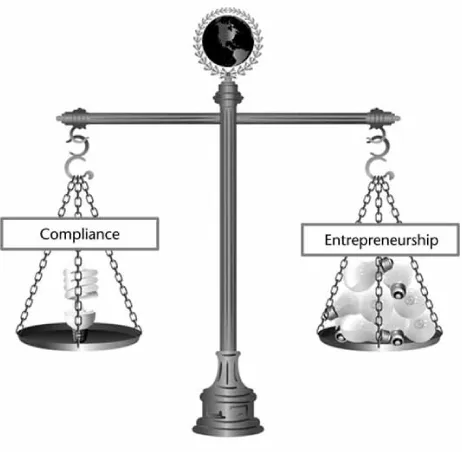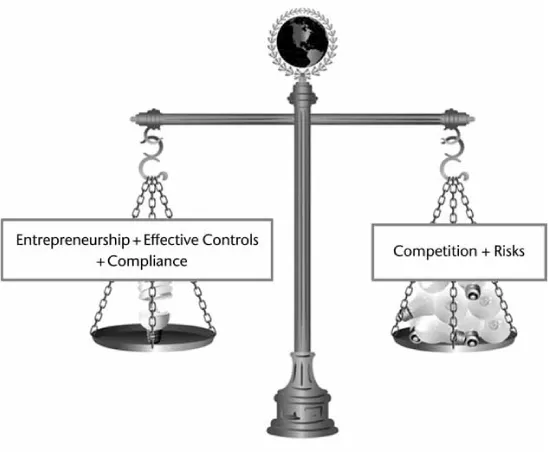![]()
CHAPTER 1
Noble Cause Corruption
Introduction
This book, which is about corruption rather than just bribery, is unavoidably long, detailed and possibly disputatious because it takes an assertive, managerial – rather than a timorous legalistic – approach to both. It is based on the principle that regulators do not run businesses and is intended mainly for commercial managers who do. It contains more detail than ordinarily would be the case, to explain some of the things not emphasised by the Cottage Industry (see Foreword), but which are very important from a managerial perspective.
It is based on the principle that companies have both the right and the obligation to manage their affairs, effectively and honestly, while putting compliance in context.
The balance – if not conflict – between compliance and entrepreneurship is typically represented in Figure 1.1.
Figure 1.1 Typical Representation of the Balance between Entrepreneurship and Compliance
In fact, there is no conflict and the objectives of entrepreneurship and compliance should be fully aligned, as represented in Figure 1.2:
Figure 1.2 The True Relationship between Entrepreneurship and Compliance
Effective controls are not a brake on a company’s performance but rather the essential equipment that empowers it to go faster and further in safety and to participate assuredly in markets perceived by others as too difficult. Effective controls provide opportunities and competitive advantages.
This book suggests more effective and realistic solutions based on four axioms:
1. Concentrate on discrete contexts in which corrupt decisions are taken.
2. ‘Perform on principle’, assert the right to take decisions and defend them with determination. Aim for ‘Inspired Integrity’ and not just compliance,
3. ‘Be the first to know’ that things might be going wrong and deal with them.
4. ‘Be an impeccable and profitable corporate citizen’ and a very hard target.
The emphasis is on ‘profitable’. It is central to the recommendations in this book and so is creating happy working environments in which prudent trust is nurtured.
Against this background, despite all of its limitations and associated political posturing, the Bribery Act 20101 should be manageable for good companies. That is, providing they do not sit frozen in the headlights waiting for honest decisions to be second-guessed. Proving that intent was demonstrably innocent and decisions were honestly taken is one of the most important concepts in this book. It is the most solid and fail-safe defence to all offences under the Act and even more importantly it saves serious money.
The Importance of Frames and Framing
Communication between people involves framing. Frames embody the social, ethical and other parameters in which dialogue takes place. In 2009 Jim A. Kuypers2 published research which concluded ‘framing is a process whereby communicators, consciously or unconsciously, act to construct a point of view that encourages the facts of a given situation to be interpreted by others in a particular manner’.
The War On Terror
The attacks on the New York, Twin Towers of 11 September 2001 were initially framed as crimes against humanity. This framing was quickly replaced and the reaction classified as a ‘war on terror’, thereby justifying a military response.
Global Warming
The hypothetical catastrophic deterioration of the planet’s climate was framed as ‘global warming’ until it became obvious that there has been no increase in temperatures since 1995. Then the framing had to be switched3 to ‘climate change’ so that citizens would support emissions reductions measures and not question escalating energy costs.
Cash For Access
Regulators have made it clear that if a business pays to arrange a meeting with a foreign government official, it will be regarded as ‘bribery’. Paying £50,000 for a dinner place with the Prime Minister at Conservative Central Office is framed as ‘lobbying’ and is therefore acceptable.
False framing is an essential element of both deception and politics. People tend to accept the frames presented to, or imposed upon them and this is certainly true of corruption and bribery. One of the most serious framing mistakes is the classification of countries based on Transparency International’s Corruption Perceptions Index.4 It leads to inaccurate risk assessment, unjustified relaxation in contexts that are unsafe and, worse still, sets up an expectation that skulduggery is inevitable.
Framing of the UK Bribery Act
The Bribery Act 2010 was framed as essential to bring the UK’s ‘antiquated laws’ (from 1889, 1906 and 1916) up to date, to comply with pressure from the Organisation for Economic Cooperation and Development (OECD) and to show that Britain – with its stereotypical stiff upper lip – sets an example for others to follow.
Digging the Same Hole Deeper
Political and regulatory posturing over the Act is at best dubious. Both the present and current Attorney Generals confirmed that the UK has always been compliant with its OECD obligations.
The reality is:
• UK anti-corruption laws were updated by the Anti-Terrorism Crime and Security Act 2001 and were thus not ’antiquated’. These complied with the OECD Convention on the Bribery of Foreign Public Officials in International Business Transactions.5
• Although the UK ratified the OECD Convention it was never incorporated into its statutes, meaning that there was, and still is, no obligation to comply.
Too Close for Comfort
In fact the UK specifically opted out of Article 15 of the Council of Europe Convention on Corruption because politicians did not like the idea of legislating against trading in influence, which would have severely constrained political skulduggery.
The fact that the new laws are framed around the word ‘bribery’ (when all previous legislation was about corruption) shows how the undoubted evil has been narrowed to avoid dealing with controversies such as trading in influence, political funding, granting of honours and privileges and, of course, the old chestnut of parliamentary privilege.
Politicians Were the Laughing Stock
The way the Blair and Brown governments reacted to the British Aerospace (BAE) investigation and the release of the Lockerbie bomber (most likely in exchange for Libyan oil concessions) made the UK a laughing stock.
Most exclusions under the Bribery Act favour politicians and civil servants. This bias is referred to in this book as ‘Animal Farm’.
Letting Civil Servants Off The Hook
Under the old Prevention of Corruption Act the burden fell on public officials to prove that any potentially questionable benefit they received was not corrupt. This very important tool in the fight against public corruption has disappeared from the Bribery Act.
The Blair–Brown Labour government in its last days before losing power rushed through the Bribery Act 2010 based on false framing.6 The offences were then narrowed even further so that the corporate bribe payer is to be punished far more severely than the organisation that did nothing to prevent extortion. Yet extortion is the driving force in most cases.
Just Like Unwanted Teenage Pregnancies
In the field of unwanted teenage pregnancies, the lopsided Section 7 offence of the UK Bribery Act is like holding the boy’s parents corporately and absolutely liable for their son’s bunga bunga while absolving the girl’s mother and father entirely.
The outcome is that government agencies – which are magnets for incoming corruption – are absolved from corporate liability even if their procedures are woefully inadequate and they condone or consent in bribe receipt.7
Another interesting point on the George Orwell8 front is the apparent lack of interest by the Serious Fraud Office (SFO) and other agencies in using their powers under the Proceeds of Crime Act (see page 185) to expose politicians, government and business extorters whose excessive personal wealth is a good indication of bribes receipt (see page 463) or other skulduggery. This is a great opportunity missed by regulators because each extorter who is exposed could identify multiple corporate bribe payers, leading to nifty Section 7 settlements. So why don’t they do it?9
The Nature of Corruption
Bribe payment can be concealed in the books of the coercer in thousands of ways (see pages 299–300) but extorters hold two very visible and ugly babies. The first are the perverted decisions leading to improper performance; the second are signs of excessive wealth. If the SFO were to focus on these, using its powers under Part 5 of the Proceeds of Crime Act 2008, it would quickly expose extorters and thereby coercers. The rule in fraud and corruption is to ‘follow the money’.
A really positive aspect of the Bribery Act, which has escaped the attention deserved, is that it potentially10 criminalises what is referred to...


